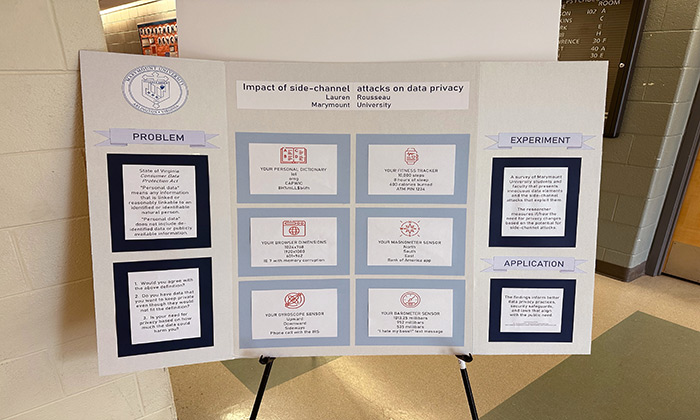In a digital landscape increasingly fraught with cyber threats, the cybersecurity field has surged to the forefront of computer sciences — attracting a wave of professionals ready to confront its ever-shifting challenges. Aspiring cybersecurity scholars are getting involved by crafting methodologies, conducting important research, attending conferences and unveiling insightful work to pave the way towards a more secure future.
Lauren Rousseau, a student in Marymount’s Cybersecurity doctoral program, has garnered attention after presenting her research last year at the Capital Region Celebration of Women in Computing (CAPWIC) Conference at Virginia State University. She attended the event, which is dedicated to providing a low-cost and regionally tailored conference for women and minorities in academia, on the recommendation of Dr. Donna Schaeffer, Professor in Marymount’s School of Technology and Innovation. Rousseau’s poster design incorporating research from her dissertation, ‘Impact of Data Harm on the Perception of Private Data in the U.S.,’ was honored with CAPWIC’s Best Student Poster Award.
“I was very humbled to learn about the award,” Rousseau reflected. “It was a grueling day, but the award instilled a sense of pride in all of that hard work.”
Rousseau, who credits her initial interest in cybersecurity to first-hand observations of its importance following large-scale data breaches in the early 2010’s, pursued research on how cybersecurity attacks can exploit seemingly innocuous data while measuring their impact on data privacy. She sought to investigate how people categorize their private data and, using a quantitative experimental design, performed a study on side-channel attacks — demonstrating ways that private information could be accessed, and measuring how individuals felt about their privacy for each piece of data presented.
“For me, cybersecurity shifted from an abstract concept to concrete actions that protect communications, data, devices and people,” Rousseau said. “I wanted to learn how to better protect myself and others.”
With the poster’s minimal design and listed examples from her literature review, Rousseau’s submission invited her audience to engage in insightful discussions about the research topic and data privacy laws. Upon receiving her doctorate, Rousseau hopes to work at the intersection of cybersecurity and data privacy.
“This area of cybersecurity is evolving, and I am open to providing value wherever I can.”






